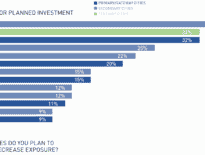
Pure entertainment concepts are expanding in the retail sector amid changing consumer expectations. Tech-infused mini golf concept Puttshack opens a 26,000-square-foot location this spring at 58 Pier 4 Blvd. in Boston. Photo courtesy of Puttshack
After working in retail real estate for more than 30 years, I would never have predicted how strong the overall industry has bounced back from what many consider to be our country’s worst economic disaster since the Great Depression.
The pandemic certainly did leave many longstanding retail chains in its wake, but those that survived have come out stronger than ever. More importantly, it has forever changed the way people shop. Now, the term “omni-channel” is no longer just a concept shared among a select group of Millennial-focused brands.
During most of 2020, the headlines consistently hailed the devastation of American retail as some of our most iconic retail brands fell victim to the pandemic: JC Penney, Lord & Taylor, Pier 1, Godiva, Barneys and Kmart. The reality is that all COVID did was accelerate the inevitable. These were already dying brands that would have sputtered along for several more years in and out of Chapter 11 bankruptcy without any real improvement to their business models, leading to eventual collapse.
In 2020 alone, there were more than 12,000 store closures, which left a clear void in the marketplace as demand started to increase in 2021. As a result, in 2021 there were more store openings than closures for the first time in over five years. Many of our own clients at Bialow Real Estate, such as Pet Supplies Plus, Sleep Number and UbreakIFix, saw an uptick in sales and an increase in store count as the strength of their brands helped to capture some of that market share.
The retailers that survived did so by focusing on meeting the needs of the consumer, which can be summed up as good old-fashioned customer service. Retailers were forced to invest in their online platforms and provide the consumer with options such as home delivery, in-store pickup and free returns. Those that didn’t have the financial capabilities to scale quickly leaned on third parties such as InstaCart, DoorDash and even Amazon to meet the ever-changing needs of the American consumer.
An Appetite for Pure Entertainment Concepts
The best example of a segment that has been completely upended by the pandemic has been the restaurant industry. Most would agree that what we’re seeing on the restaurant side is a definite improvement in terms of the overall experience. Fast-food and quick-casual chains have adapted by focusing on adding drive-throughs, developing pre-order apps and partnering with local delivery services as speed and efficiency has become paramount to compete within that space. Some of our fast-food clients such as Wendy’s and Dunkin’ saw double-digit increases in sales even during the height of the pandemic. On the full-service side, we’re seeing many of our new clients offer entertainment aspects that have become referred to as “eatertainment” concepts such as AceBounce, Puttshack, Formula 1, Flight Club and The Museum of Ice Cream.

Corey Bialow
We’re also seeing a generational shift in terms of what Millennials and Generation Z have come to expect in terms of pure entertainment concepts. Prior to COVID, the typical options for kids ranged from Chuck E Cheese to a traditional movie theater. Now we have clients that include esports gaming arena Belong Gaming, virtual reality concept Sandbox VR and Launch Entertainment, which at 30,000 to 50,000 square feet is basically a “Chuck E. Cheese” on steroids.
The one common theme we are seeing throughout the country is that after two years of lockdowns, quarantines, social distancing and mask-wearing, the American consumer has returned with a fervor and is expressing an eagerness to shop, eat, socialize and entertain themselves like never before. This is all in the face of massive inflation, labor shortages, supply chain issues and a war in Eastern Europe. I guess what they say is true: “Shopping is still America’s Pastime.”
Corey Bialow is CEO of Bialow Real Estate.






